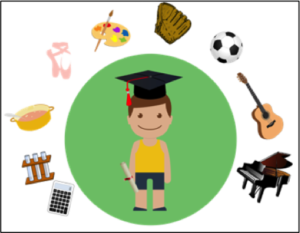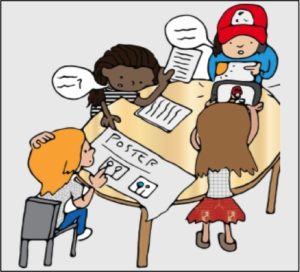The benefits of extracurricular activities
- June 23, 2020
- Posted by: Aditti Gupta
- Category: HIGH SCHOOL

When students begin to form their resumes for future studies, they need more than just academic achievements on that list. So, making more of other opportunities that arise within your interest is crucial to build a strong resume as well as develop some new skills. Getting involved in sports clubs, taking Olympiad tests, participating in MUN workshops, or volunteering for any event or internship is a great way to interact with new faces and develop new skills. They ensure that you maintain a healthy balance between studying and social life!
Extracurricular activities bring with them a range of benefits and serve great credit to a student’s resume. Such activities are essential to standard school life and play a significant role in a student’s personalities and future studies.
1. Diversifying

Participating in a variety of activities, be it sports, a writing competition, or a workshop may enhance your skills in numerous areas. Diversifying and developing a range of skills through such experiences may allow you to be productive in a future workplace as you may have a lot to offer.
2. Broaden your horizon

Gathering knowledge from different kinds of resources from such a range of activities may broaden your horizon and lead you to think outside the box for any personal endeavors you may pursue.
3. Strengthen social skills

Meeting new faces and learning how to reach a goal collaboratively will enhance your cooperation and social skills. It may further open your mind to new ideas as you converse with different new personalities.
4. Add to your resumes

Such activities further add great credit to your resumes, while many colleges tend to look at what a student has achieved besides academically. Adding such credits may prove to a college that you have a range of skills to offer, and past experience to display.
5. Improving Academic performance

Being able to utilize academic skills in an extracurricular activity would further better your skills within that subject. For instance, participating in a history quiz would help you learn new facts for the good in your history lessons.
6. Building life skills

While practising social skills, as students begin to interact with one another, they may strengthen life skills such as leadership, communication, decision making and participation.
7. Generating confidence

While sharing ideas, thoughts and insights, students are able to build up self-esteem and confidence as their inputs get accepted. Being able to converse with a large audience is a skill that such activities largely offer.
8. Evaluates your academics

Executing the skills, you learned in your daily school life in such activities may act as an evaluator for your strengths in that particular subject. For instance, you may be able to understand your downfalls or status in English by participating in a writing competition.
Credit:
This blog has been contributed by Nandini Sarin, a class 9 student of Pathways World School Aravali, interning with PPRO EED.
